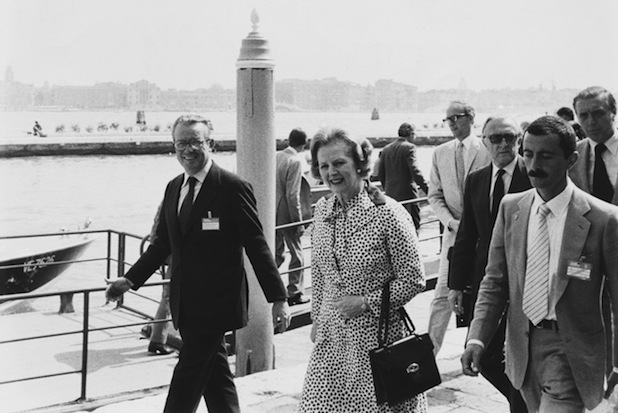Now that the forces of evil have transformed Silvio Berlusconi into a condemned man, there remains just one person on the planet who can save Italy: Roger Scruton.
If the famous philosopher were just to come to Italy to deliver a single speech, his very words would be enough to set in motion la rivoluzione. That at least is the view of the Circolo Culturale Margaret Thatcher, a group whose mission it is to establish at long last, after all those centuries lived without one, a proper Anglo-Saxon Tory party in Italy. So far it has failed, but its members, like all true believers, have not lost their faith.
A year or so ago, Tullia Vivante, the presidentessa of the Thatcher Circle, an effervescent widow in her seventies, decided to enlist my support in getting Scruton to come to Venice. ‘There is no time to lose,’ she said. She had read an article I’d written on how Berlusconi, for all his faults, was Italy’s best hope: the only Italian politician with the charisma, clarity and drive necessary to impose on Italy the key conservative concept of freedom — freedom from the state.
‘I don’t know Scruton,’ I told her. ‘Will Charles Moore do? I know him quite well because he used to be my editor.’
To which she replied: ‘Charles who?’
‘The authorised biographer of the Dama di ferro!’ I explained.
‘Sì, va bene, va benissimo!’
Well, I did try Charles and he agreed in principle. But then in April Lady Thatcher died. That was that: he had even more on his plate than usual.
Anyway, for better or worse, it is Roger Scruton, not Charles Moore, with whom la signora Vivante is besotted, as the invitation she has just sent to the contemporary thinker who perhaps best articulates conservatism testifies. She emailed me a copy of it a couple of days ago because it is my duty, she insists, to use all means at my disposal to convince Scruton to come to Venice. The letter had been translated into English, she said proudly, by professor Marco Morin, one of the most authoritative ‘consulenti forensi di balistica di esplosivistica’ who ‘speaks English, lucky him, perfettamente’.
The letter begins: ‘I am the President of what is, according to Nicholas Farrell, the only cultural association in the world named after Margaret Thatcher.’ Oh God, no! I thought. It may even be true but I never said it. And why on earth mention me? The letter continues: ‘I must confess that since many years ago I am following your activities and that I have read with great interest the Italian translation of your Meaning of Conservatism; I have furthermore been collecting all the newspaper articles I can found on you and your thesis. As a collateral result in Venice everybody knows that you are my great love, politically speaking of course. For a long time, in my small way, I represented with my Circle, and not only in Venice, an embryo of conservatism of Anglo-Saxon fashion.’
Yes, it’ll do. The less than perfect translation, when all is said and done, is probably a plus.
The letter concludes: ‘I am now asking you the great favour to come to Venice, of course at our expenses, and perhaps with a journalist of your liking, to present your Meaning of Conservatism, the Bible of the Tories. This way, here with my association, I can try to hand over, as a patriotic Thatcheritism, the baton of an Italian Tory Party to a leader able to embody the values of the Iron Lady, and, prominently capable to translate said values to the complex Italian society.’
I have tried to tell la signora Vivante that she is wasting her time. For a start neither Scruton nor Moore, God bless them both, is the Messiah — not in Italy at least — because neither is capable of performing a miracle, which is what it would take to found a proper Conservative party in Italy. There is no Anglo-Saxon Tory party in Italy, and never will be, for one simple reason: whereas the British, until contaminated by the European Union at least, believe the smaller the state, the greater the freedom; the Italians believe that only the state can bring freedom. This explains, among other things, why ‘right-wing’ in Italy means fascist, which has always struck me as surreal, given that fascism has far more in common with communism than it does with the Anglo-Saxon right.
When I spoke to the Thatcher Circle in the great hall of palazzo Ca’ Vendramin Calergi on the Grand Canal in Venice last May, I tried to tell the audience all this. I quoted the French anthropologist Gustave Le Bon whose La Psychologie des Foules was a big hit with Europe’s chattering classes when published in 1895.
Le Bon, who defined his époque as ‘The Era of the Crowd’, wrote: ‘For the Latin peoples the word “democracy” signifies more especially the subordination of the will and the initiative of the individual to the will and the initiative of the community represented by the state… Among the Anglo-Saxons and notably in America this same word “democracy” signifies, on the contrary, the intense development of the will of the individual, and as complete a subordination as possible of the state.
‘A Latin crowd, however revolutionary, or however conservative it be supposed, will invariably appeal to the intervention of the state to realise its demands. It is always distinguished by a marked tendency towards centralisation and by a leaning, more or less pronounced, in favour of dictatorship. An English or an American crowd, on the contrary, sets no store on the state, and only appeals to private initiative.’
Such words were not what the Venetian disciples of Roger Scruton, so passionately determined to spread the Anglo-Saxon Tory gospel at long last to Italy, wanted to hear at all, and la signora Vivante simply switched off my microphone while I was in mid-flow.
The baton, therefore, now passes to Professor Scruton and also, let us pray, to Charles who?
Got something to add? Join the discussion and comment below.
Get 10 issues for just $10
Subscribe to The Spectator Australia today for the next 10 magazine issues, plus full online access, for just $10.
You might disagree with half of it, but you’ll enjoy reading all of it. Try your first month for free, then just $2 a week for the remainder of your first year.














Comments
Don't miss out
Join the conversation with other Spectator Australia readers. Subscribe to leave a comment.
SUBSCRIBEAlready a subscriber? Log in